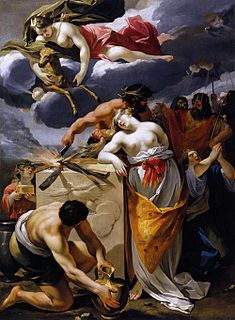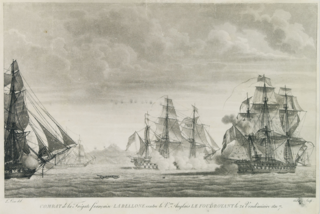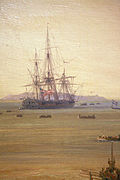Seven ships of the French navy have borne the name Iphigénie, in honour of Iphigenia.

In Greek mythology, Iphigenia was a daughter of King Agamemnon and Queen Clytemnestra, and thus a princess of Mycenae.
Seven ships of the French navy have borne the name Iphigénie, in honour of Iphigenia.

In Greek mythology, Iphigenia was a daughter of King Agamemnon and Queen Clytemnestra, and thus a princess of Mycenae.
Iphigénie was a 32-gun Iphigénie-class frigate of the French Navy, and the lead ship of her class. She was briefly in British hands after the Anglo-Spanish capture of Toulon in August 1793 but the French recaptured her December. The Spanish captured her in 1795 and her subsequent fate is unknown.

The Iphigénie class was a group of nine 32-gun/12-pounder frigates of the French Navy, built during the late 1770s at Lorient and Saint Malo. They were designed by Léon Guignace. The seven built at Saint Malo were initially numbered Nos. 1 – 7 respectively, and not given names until October 1777 and the start of 1778 ; all seven were captured by the British Navy between 1779 and the end of 1800. Of the two built at Lorient, the Spanish captured one, and a storm wrecked the other.

The French frigate Iphigénie was a Pallas-class frigate of a nominal 44 guns, launched in 1810. The British captured her in 1814. The British named her HMS Palma, and then renamed her HMS Gloire. She was sold in 1817, never having been commissioned into the Royal Navy.




To date, seven ships of the French Navy have borne the name of Suffren, in honour of the 18th-century French admiral Pierre André de Suffren.
Four ships of the French Navy have been named in honour of the 18th century admiral count Toussaint-Guillaume Picquet de la Motte.
Five ships of the French Navy have been named in honour of the 19th century privateer Robert Surcouf:
Three ships of the French Navy have borne the name Latouche-Tréville in honour of the 19th century politician and admiral Louis-René Levassor de Latouche Tréville.
Gloire, meaning "glory", has been a popular name for French vessels.
Seven ships of the French Navy have borne the name Protée, in honour of Proteus.
Fifteen ships of the French Navy have borne the name Minerve, in honour of goddess Minerva
Twelve ships of the French Navy have borne the name Hermione, in honour of Hermione, daughter of King Menelaus of Sparta and his wife, Helen of Troy.
A number of ships of the French Navy have borne the name Méduse, after the Medusa. The best-known is arguable the 1810 frigate Méduse, of Théodore Géricault's Raft of the Medusa fame.
Five ships of the French navy have borne the name Clorinde, in honour of Clorinda in Jerusalem Delivered.
Five ships of the French Navy have borne the name Melpomène, in honour of the muse Melpomene.
Twelve ships of the French Navy have borne the name Mutine ("Mischievous"):
Seven ships of the French Navy have borne the name Andromaque in honour of Andromache, wife of Hector, daughter of Eetion, and sister to Podes.
Twelve ships of the French Navy have borne the name Thétis in honour of nereid and sea nymph Thetis:
Six ships of the French Navy have borne the name D'Entrecasteaux in honour of Antoine Bruni d'Entrecasteaux:
Eleven ships of the French Navy have borne the name Diane in honour of Diana, goddess of the hunt, the moon, and nature in Roman mythology. In addition, two have borne the related name Diana:
Three ships of the French Navy have borne the name of Sané, in honour of the 18th-century French engineer Jacques-Noël Sané.
A number of ships of the French navy have borne the name Guerrière.
A number of ships of the French Navy have borne the name Astrée in honour of Astraea in Greek mythology.
Several ships of the French Navy have borne the name Gaulois ("Gaul"):

The International Standard Book Number (ISBN) is a numeric commercial book identifier which is intended to be unique. Publishers purchase ISBNs from an affiliate of the International ISBN Agency.

OCLC Online Computer Library Center, Incorporated d/b/a OCLC is an American nonprofit cooperative organization "dedicated to the public purposes of furthering access to the world's information and reducing information costs". It was founded in 1967 as the Ohio College Library Center. OCLC and its member libraries cooperatively produce and maintain WorldCat, the largest online public access catalog (OPAC) in the world. OCLC is funded mainly by the fees that libraries have to pay for its services. OCLC also maintains the Dewey Decimal Classification system.
| This article includes a list of ships with the same or similar names. If an internal link for a specific ship led you here, you may wish to change the link to point directly to the intended ship article, if one exists. |